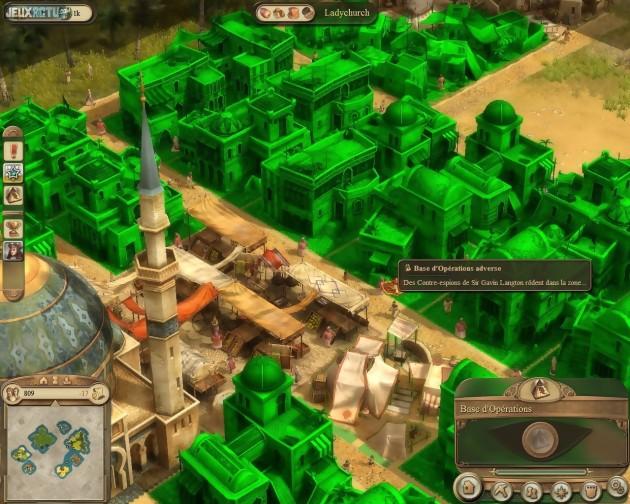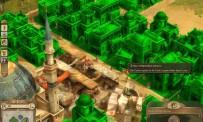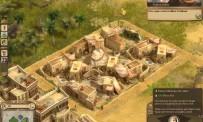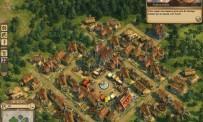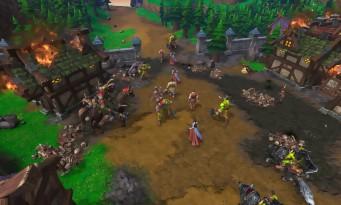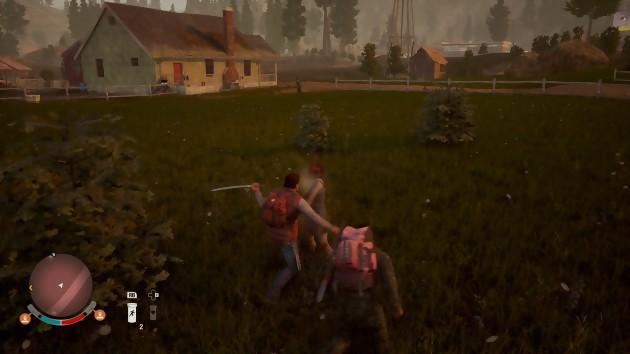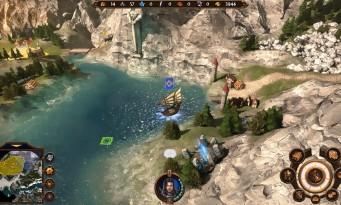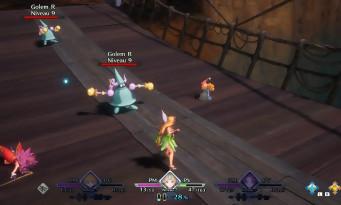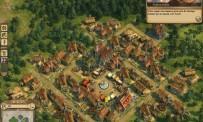 First of all, it should be noted that this extension is not autonomous, contrary to the majority trend of recent years. It is therefore imperative to have Anno 1404 to be able to enjoy it. Consequently, there is no need to recall the basic principles of the series! We will content ourselves with indicating to the innocent who would still be unaware of it that the Anno are among the best management games that have ever existed, and that it is imperative to have played episodes 1701 or 1404 at least once in its existence, under hard to join the sixth circle of hell when the time comes to pass from life to death. These clarifications having been made, let us detail the few novelties brought by Venice. The most important certainly concerns the appearance of a multiplayer mode, which we regretted the absence in the original game. It must be said that the previous episode (Anno 1701) had it and that this regression seemed totally incomprehensible. Bad minds (some will rather speak of enlightened minds...) will not fail to see there a typical baseness of the big video game publishers: voluntarily amputating a title of some functionalities in order to be able to sell them later in the form of extension or downloadable content. Everyone will like it, or not, depending on their sensitivity and their ability to withstand the trick! Still, this multiplayer mode increases the game possibilities tenfold, since it not only allows eight players to compete, but also allows cooperation. Up to four companions can thus join the same team in order to manage the economic development of their colony in perfect coordination. All then share the control of constructions, finances, trade routes, which requires a perfect agreement under penalty of creating strong internal dissensions.
First of all, it should be noted that this extension is not autonomous, contrary to the majority trend of recent years. It is therefore imperative to have Anno 1404 to be able to enjoy it. Consequently, there is no need to recall the basic principles of the series! We will content ourselves with indicating to the innocent who would still be unaware of it that the Anno are among the best management games that have ever existed, and that it is imperative to have played episodes 1701 or 1404 at least once in its existence, under hard to join the sixth circle of hell when the time comes to pass from life to death. These clarifications having been made, let us detail the few novelties brought by Venice. The most important certainly concerns the appearance of a multiplayer mode, which we regretted the absence in the original game. It must be said that the previous episode (Anno 1701) had it and that this regression seemed totally incomprehensible. Bad minds (some will rather speak of enlightened minds...) will not fail to see there a typical baseness of the big video game publishers: voluntarily amputating a title of some functionalities in order to be able to sell them later in the form of extension or downloadable content. Everyone will like it, or not, depending on their sensitivity and their ability to withstand the trick! Still, this multiplayer mode increases the game possibilities tenfold, since it not only allows eight players to compete, but also allows cooperation. Up to four companions can thus join the same team in order to manage the economic development of their colony in perfect coordination. All then share the control of constructions, finances, trade routes, which requires a perfect agreement under penalty of creating strong internal dissensions.
Don't see Venice and die
 The solo is not to be outdone since it is enriched with fifteen independent scenarios, which seriously support the six already present in Anno 1404. But those who hoped for a large free campaign allowing them to build their own Venetian city will be disappointed. costs. This is not the purpose of the game, contrary to what its subtitle might suggest. The Italian vibe is mostly distilled through the new characters in the scenarios and the cities they control, but it's never about building canals and gondolas yourself. This possible misunderstanding ruled out, therefore remain quite varied and rather pleasant little adventures for those who like to have goals to achieve. Some skip over any management and construction phase, such as The Istar Labyrinth which plunges one of our boats into a maritime maze in search of several treasures. Others, on the contrary, require a real talent as an urban planner, such as those placing us on infertile land or possessing little building land. Most scenarios focus on a specific point (adventure, development, diplomacy, war, etc.) and going through them one after the other allows you to experience all the new gameplay features introduced in the expansion. We think in particular of sabotage operations, which are as pleasing in solo as in multiplayer. To play trickster, all you have to do is build a Base of Operations on your island. In order to remain as discreet as possible, it takes on the appearance of a classic dwelling. You can then send a spy to invest an opposing dwelling. Depending on the level of civilization of the infiltrated house, the secret agent will be able to carry out different acts of sabotage (for example pyromania, revolt or poisoning depending on whether he has taken possession of a peasant, citizen or patrician house).
The solo is not to be outdone since it is enriched with fifteen independent scenarios, which seriously support the six already present in Anno 1404. But those who hoped for a large free campaign allowing them to build their own Venetian city will be disappointed. costs. This is not the purpose of the game, contrary to what its subtitle might suggest. The Italian vibe is mostly distilled through the new characters in the scenarios and the cities they control, but it's never about building canals and gondolas yourself. This possible misunderstanding ruled out, therefore remain quite varied and rather pleasant little adventures for those who like to have goals to achieve. Some skip over any management and construction phase, such as The Istar Labyrinth which plunges one of our boats into a maritime maze in search of several treasures. Others, on the contrary, require a real talent as an urban planner, such as those placing us on infertile land or possessing little building land. Most scenarios focus on a specific point (adventure, development, diplomacy, war, etc.) and going through them one after the other allows you to experience all the new gameplay features introduced in the expansion. We think in particular of sabotage operations, which are as pleasing in solo as in multiplayer. To play trickster, all you have to do is build a Base of Operations on your island. In order to remain as discreet as possible, it takes on the appearance of a classic dwelling. You can then send a spy to invest an opposing dwelling. Depending on the level of civilization of the infiltrated house, the secret agent will be able to carry out different acts of sabotage (for example pyromania, revolt or poisoning depending on whether he has taken possession of a peasant, citizen or patrician house).
This is not the purpose of the game, contrary to what its subtitle might suggest. The Italian vibe is mostly distilled through the new characters in the scenarios and the cities they control, but it's never about building canals and gondolas yourself."
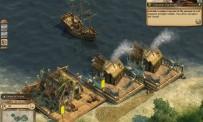 Eastern civilizations are not to be outdone since invading a nomad's or emissary's house can divert the attention and money of the inhabitants with the help of a belly dancer or a false prophet. The sabotage function therefore maintains a real game of cat and mouse. Indeed, the Bases of Operations also allow us to inform us of the presence of enemy spies, which we must then search for by inspecting one by one the houses of our choice (which takes time and costs money) or catch them in the act by spotting them with the naked eye among our population and clicking on them before they have been able to commit their misdeed. If this is the most pleasant novelty of this extension, we must not forget the others. Starting with the volcanic islands, which allow you to fully customize the deposits of raw materials. On the other hand, you have to live with a sacred sword of Damocles above your head: the potential eruption of the volcano, likely to destroy all the surrounding buildings. Anno 1404: Venice also develops the concept of "city council", thanks to which one can control a city by buying a majority of seats. Note in passing that, like most of the new features of this extension, this function can be activated or deactivated in the options. Finally, the construction of the "Circumscription" building reduces the maintenance costs of all the production buildings on the island and gives access to a new menu that provides statistics and detailed information on operating costs, productivity, population, income, etc. A nice addition that sums up quite well the nature of this extension: pleasant but never revolutionary.
Eastern civilizations are not to be outdone since invading a nomad's or emissary's house can divert the attention and money of the inhabitants with the help of a belly dancer or a false prophet. The sabotage function therefore maintains a real game of cat and mouse. Indeed, the Bases of Operations also allow us to inform us of the presence of enemy spies, which we must then search for by inspecting one by one the houses of our choice (which takes time and costs money) or catch them in the act by spotting them with the naked eye among our population and clicking on them before they have been able to commit their misdeed. If this is the most pleasant novelty of this extension, we must not forget the others. Starting with the volcanic islands, which allow you to fully customize the deposits of raw materials. On the other hand, you have to live with a sacred sword of Damocles above your head: the potential eruption of the volcano, likely to destroy all the surrounding buildings. Anno 1404: Venice also develops the concept of "city council", thanks to which one can control a city by buying a majority of seats. Note in passing that, like most of the new features of this extension, this function can be activated or deactivated in the options. Finally, the construction of the "Circumscription" building reduces the maintenance costs of all the production buildings on the island and gives access to a new menu that provides statistics and detailed information on operating costs, productivity, population, income, etc. A nice addition that sums up quite well the nature of this extension: pleasant but never revolutionary.
